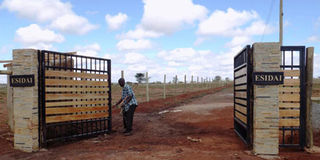Gated farms: New frontier in commercial farming

Esidai gated farm near Amboseli National Park off the Nairobi-Mombasa highway. PHOTO | RACHEL KIBUI | NATION MEDIA GROUP
What you need to know:
- The farmers are expected to start tilling and planting next month and will jointly contract a firm that will provide workers including a general manager, an agronomist, a plumber and security staff.
- Stanley Karimi, a senior technical officer at Kenya Agriculture and Livestock Research Organisation, says community farming only helps to cut costs by sharing resources like water and farm workers.
- Peter Njagi, the manager of the project at HassConsult Real Estate is at the farm to check on the progress of electricity connection.
Along the Nairobi-Mombasa highway, near Emali Town, a curious sign post arrests the eye.
It reads; “Esidai Farms, 4-acre gated serviced farms,” in bold green letters against a white board.
Everyone know about gated real estate communities and the name might persuade one to think it should read; ‘Esidai Gated Homes’.
The gated farm lies some 14km off the Mombasa Road in the direction of Amboseli National Park. It is 100 acres.
Peter Njagi, the manager of the project at HassConsult Real Estate is at the farm to check on the progress of electricity connection.
Njagi is a professional borehole driller and says the land is sub-divided into 25 plots, each measuring four acres and was sold for Sh5 million.
Some of the owners have fenced their parcels and are waiting for electricity connection before they start tilling. There are three boreholes that can produce 500,000 litres of water daily. Each farm therefore has about 20,000 litres of water for irrigation daily.
“We have analysed the soil on each parcel and received recommendation of the suitable crops to grow,” explains Njagi, adding that he plans to grow mangoes on his land.
HERBS FOR EXPORT
“The owner of this piece wants to specialise in Indian indigenous herbs for export,” Njagi says as he walks me from one piece to another.
“This other one is owned by three brothers,” he adds while pointing at a fenced parcel. “They will construct a farmhouse and each of them will be travelling here on a weekend as they alternate to check on their greenhouses where they will grow tomatoes and capsicum.”
So far, two farmers have expressed interest in commercial livestock keeping. One of them, according to Njagi, plans to keep dairy cows while the other rabbits and poultry.
Gated farming is a new concept billed as a response to rapid urbanisation, which has seen real estate developments kill agriculture. It will also address the worry about future access to, and affordability of, food in the cities.
Many of the owners know exactly what to grow, but none has expressed plans to settle there permanently. Says Njagi, “We will have a total of 2,700 assorted trees all around the farm. We have started planting them even as one farmer plans to establish a commercial tree nursery.”
Currently, the vast farm has one worker who takes care of security.
The farmers are expected to start tilling and planting next month and will jointly contract a firm that will provide workers including a general manager, an agronomist, a plumber and security staff.
“By having a general manager, no worker would release any produce from any farm without his knowledge as well as informing security,” says Njagi. This will minimise theft.
Each farmer will sell their produce independently. However, the contracted company will monitor demand for produce and help in getting the best prices in markets.
So, how did the idea of gated farms come about?
WISHED TO FARM
“I conceived the idea over a year ago,” says Njagi. “My friends and I owned land in different areas outside Nairobi, and each one of us wished to farm.” Born and bred in Nairobi, Njagi says he has always had a passion to have a taste of village farming life.
“After talking to my friends, who had land in Kajiado, Naivasha and Machakos, I realised we shared a similar problem. Getting power connection, drilling boreholes, making roads and high cost of labour was a big challenge.”
However, while his friends liked the idea of farming together, trust remained a big setback considering the many technicalities that surround land buying and joint management.
“That was when I approached HassConsult, who introduced the gated concept.”
The project sold out in two months, creating more demand. “We introduced the concept to potential clients during a home’s expo in Nairobi in November last year. We sold out all the 25 pieces,” he says, adding that plans are underway to put up similar farms in Kajiado, Nyahururu, Naivasha and Nanyuki, where they have identified land.
Residents are happy since they will get jobs.
CUT COSTS
Stanley Karimi, a senior technical officer at Kenya Agriculture and Livestock Research Organisation, says community farming only helps to cut costs by sharing resources like water and farm workers.
Farmers also learn from each other.
“A single farmer will need the same number of security guards as 25 farmers meaning it is cheaper to join hands.”
The farmers will jointly invite experts to speak to them on farming and then share the cost.
But he advises that the soil samples from each farm must be tested separately for the farmers to be advised on the suitable inputs and crops.
“The fact that you are all on the same vast farm does not necessarily mean you need similar types of fertilisers because soil in some sections vary in terms of nutritional content.”
He advises the farmers to use certified, high quality seeds to prevent diseases caused by low quality seeds. Such diseases, Karimi says, would pose risks to other farms.
“Farm owners must also control soil erosion by digging trenches at the edges of their farms to prevent spread of soil-based diseases to different farms.”





